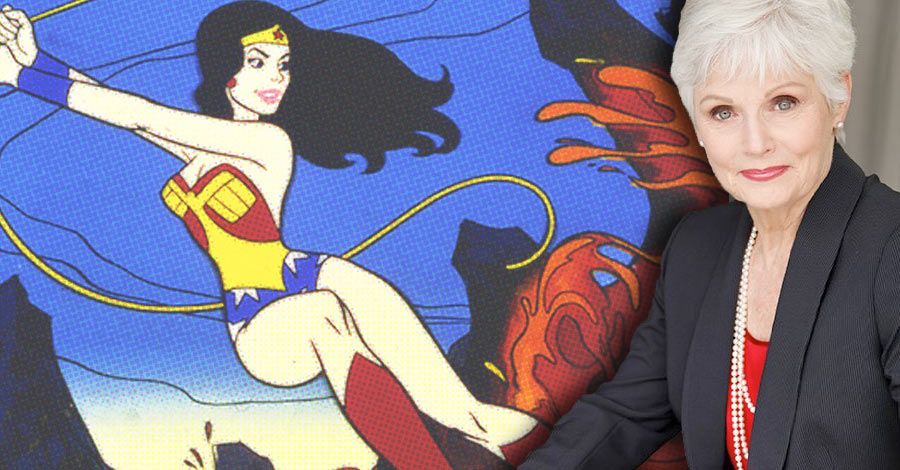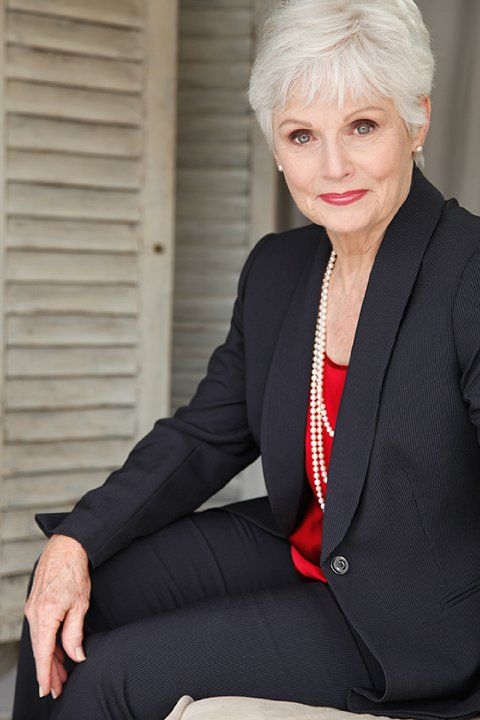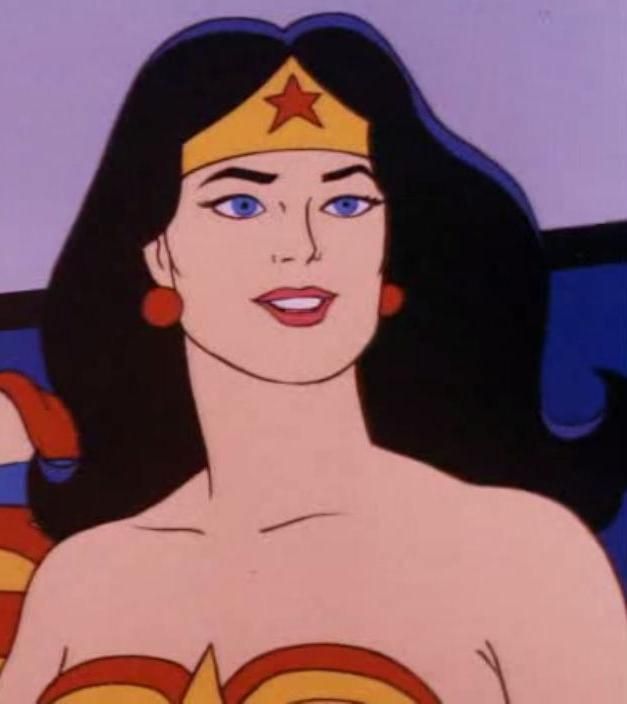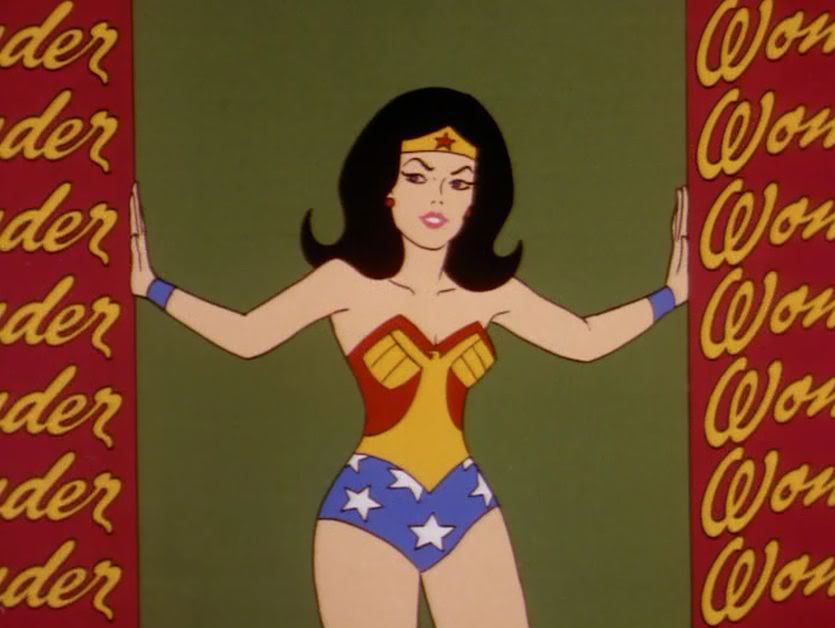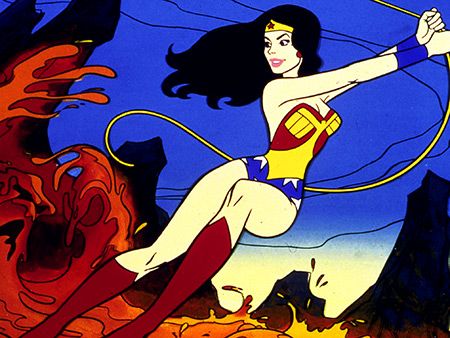If you're of a certain age, you still have a pretty clear notion of what Wonder Woman's voice sounds like -- and it isn't Lynda Carter.
For die-hard fans of Hanna-Barbera's now-iconic "Super Friends" cartoon and its subsequent incarnations -- which in 1973 became the first ongoing TV series to regularly feature Wonder Woman, alongside her fellow Justice Leaguers -- the Amazing Amazon sounds a lot like actress Shannon Farnon, who lent her strong, determined but compassionate voice to the superheroine two years before Carter added her version into the mix with the live-action primetime "Wonder Woman" series.
A busy performer in film, television and advertising throughout her still-active career (her TV resume alone is filled with episodes of classic fare, including "My Favorite Martian," "The Man From U.N.C.L.E.," "I Dream of Jeannie," "Quincy," "Dallas" and "The Love Boat"), Farnon -- who voiced Wonder Woman for nearly a decade -- has recently been meeting her longtime fans at conventions and appearances and letting them put a face to that distinctive voice.
As she prepares for an autograph signing at the Hollywood Show in Los Angeles on Jan. 24, Farnon reminisced about her Amazon era with CBR News.
CBR News: What were you doing at the time that the call to possibly be the voice of Wonder Woman came your way? What was going on in your life right then?
Shannon Farnon: [Laughs] I was probably home doing the laundry! No, actually, Wonder Woman -- she is, we'll call it a ten-year gig, but it wasn't ever 10 years. My career has been very varied: commercials, films, television, voice-over, print, looping, you name it. So, when this came in, it was quite out of the blue. I had worked for the director, Wally Burr -- we did a Flintstones Vitamin commercial, oh, I don't know how much before this time, but I knew him from that -- and my agent called and said that they'd like to see you at Hanna-Barbera to audition for the voice of Wonder Woman. I don't know why, because I had never done cartoons prior to this. Even though I had done voiceover work, I'd never thought of getting into the cartoon thing. So I graciously said, "I'd love to do that. That would be fun. Every girl's dream is to be Wonder Woman." I went over and at the audition we worked together, Wally and I. They sent the audition to the network and the rest is history.
This was 1973 -- two years pre-Lynda Carter Wonder Woman -- when you got the gig. The character wasn't quite as ubiquitous as she has become over the years. The mainstream public was still learning to fall in love with Wonder Woman. What did you find that you enjoyed or really appreciated about that character?
Well, I appreciated the fact that I knew a little bit of history about the creation of Wonder Woman. And that in itself is a subject all of its own. But the author, the creator of the character of Wonder Woman, was during the time when women were still trying to get some kind of equality -- of course, we still are, but that was a particular time. You know, the New Age movement was going on, and he was quite a character himself. He'd done free love and open marriages. He was an interesting man. It's a very interesting story, which has just been rewritten -- [the author's] name is Jill Lepore and she's written quite a good book about it.
Anyway, she represented to me, as a child, the strong, capable woman. And not a bully particularly, just a woman who didn't necessarily require the assistance of a man to get through life. And so the idea of "What are we going to do with her?" was very important at the time, because the core Super Friends group -- Superman, Batman, Robin and Wonder Woman -- all represented the conquering of good over evil, without necessarily the killing. Nobody died in these cartoons. People were managed. And Wonder Woman was a representative of that from the female perspective, which Mr. [William] Marston, the creator, wanted to get across, that we needed more of this female aspect in society in order to have a better balance.
So, it was rather important at the time to get a feeling for her: How strong to make her. How powerful. How feminine. How masculine. So we worked on her, and she came about in various levels of -- we'll call it, "depth"; because through the years occasionally we'd soften her up a little, occasionally we'd toughen her up a little. And I think that's why they really don't know what to do with Wonder Woman. They've never really grabbed a hold of that character like they have the other super-people, because -- well, I'm sure you've seen the cartoons and the takeoff on the cartoons, where you'll see her looking like a bombshell, or you'll see her looking like a steroid weightlifter. You'll see her looking innocent, which of course was the initial look that she had innocence, more open faced instead of tough and firm and muscular.
So they've never known where to go with her and of course Lynda Carter, what was that on, a year or two? She was the beauty contest winner, and they went through that portrayal of her during that period of time: the beauty contest winner who could also do magic things with her golden lasso and not very muscular looking, but certainly a beautiful woman. And there hasn't been much done with her since.
What was your experience like? I know voice actors often work in a vacuum, but did you get to spend time in the booth with some of your colleagues while you were working on the various "Super Friends" shows?
Yes, that was one of the thrills of the whole process. First of all, we always tried to make that happen. If we had another gig doing something somewhere, they would make arrangements for us to come in by ourselves, and cover it that way, but we always had the goal and always wanted to be together because you're talking about some wonderful talent in these shows, some marvelous voice work. And we did work together. Sometimes we had ten mics going, and that's wonderful. Because you not only get to play off of each other, but the humor and the fun that we had at the sessions, was really, really wonderful. It was so fulfilling. It was an arena that I never thought I'd find myself. And you had the opportunity, in cartoon world, to do things you would never be required or even thought to be asked to do on film.
And working with people like Frank Welker and Michael Bell -- people who just have endless voices, endless cartoon tricks up their sleeves, the Mel Blancs of my day. That was the most satisfying thing. We all looked forward to it very much. And we did it seasonally. We didn't do it every day of the year -- I think we went in every spring, and worked on it. And of course, we did the voices from a storyboard and they get three voices for the price of one, so you really got to stretch yourself as a performer. And it really was just a joyful time.
As time has passed and you've done interviews, gone to fan conventions and discovered the reach that your voice as that character had, what has that experience been like for you? To find out that your work really did resonate with that sort of invisible audience that can be out there when you're doing a project like this?
That's a very timely question. I just recently did my very first appearance at one of these wonderful festival shows and that was in Knoxville, Tennessee and I was just amazed at the reception and the warmth and the genuine feeling that that character and those cartoons, they were molded by this. They grew up glued to this material, and of course, that really -- I mean, I know they're out there, because fan letters let you know they're out there, but that one-on-one, face-to-face communication with a fan who comes in with seven or eight items that he's been saving with Wonder Woman images and Wonder Woman dolls and wanting me to autograph [them]. It was truly an awesome thing for me. I just was blown away by it. And then I'm planning to do one day at the end of January.
You grew up around show business. The voice acting as Wonder Woman has only been a fraction of your professional life. What was your experience like growing up in and around Hollywood? Tell me what that's been like to live that life from such a young age.
In my case, the case of my family, we were an entertainment family. My father [Brian Farnon] was the orchestra leader -- He had an orchestra leader job most of his life. He was an orchestra leader at Harris Club in Lake Tahoe for 30 years. My mother [Rita Oehmen] was an actress in films for a brief time between '39 and '41 and wound up doing for many years a song and comedy act, and prior to that from a time in Vaudville, she and her brother did a song-and-dance routine as children. So we were three girls who had that as our normal day. That's our normal life. My dad's two brothers were major music people: Robert Farnon, light classical music; Dennis Farnon, the music writer for "Bullwinkle." I mean, This was what we did. It's sort of like the kids who grow up in the family with the doctor.
So we had all the classes -- anything we wanted to do, we did and we loved it. We never felt pushed into it and each one of us went into it gradually and I just was very fortunate to have some longevity. I've always looked at it as just a wonderful business to try to be a part of as many aspects as I could. And although it would have been wonderful to be a star, I was very happy to be working all the time. I've done so many commercials -- I wouldn't even begin to tell you -- a lot of television shows, industrial films. I never really looked askance at any particular area of the business. To me it was just a great way to make a living.
That's a great attitude. Have you ever just been out and about and been shocked that somebody recognized you for your voice as Wonder Woman?
Yes! Oh, I must share an experience. No interviewer has ever asked me that, and I had an experience not that long ago. I'm going to say two years ago: my husband and I went up to visit his sister and her husband and it was our anniversary and they surprised us with renting this charming hotel, almost right out of the film Somewhere in Time, and we were just going to be there for a day or two. And we were in our travel clothes -- need I say more? -- walked into this hotel; and we were with his sister and her husband because we were all going to go to dinner, went to the front desk. I gave my name. Now I don't use my professional name in my private life. This young girl --and she could not have been over 30 -- she said, "Oh my God! Are you the voice of Wonder Woman?" [Laughs] You could have knocked me over with a feather. Yeah, that was a first.
That's fantastic.
That was a first. I've been recognized as being an actress many times over the years -- more so out of LA than in LA, because you're pretty used to seeing people you think you know in LA. But never has that happened to me.
Do you have a favorite memory of doing the job? Was there a particular day that things got especially fun or silly or challenging?
Well, to be honest, every day was fun and challenging, because as I said you stretch yourself more than you normally would in another role. I mean nobody's going to call me to play a German scientist. I mean, it would be nice if they did. [Laughs] It hasn't happened yet. I have to say that the most fun -- we'll call it the freest fun of the whole experience -- was after Turner Cartoon Network bought "The Challenge of the Super Friends" and had them on all the time, and we started doing these promos for them, which were very tongue in check -- very, very funny. I was rolling around on the booth floor, with just the parody that we were doing on the Super Friends. The four of us going into a movie theater to watch a movie and falling over each other and saying, "It's your turn to buy the popcorn" and things like that. Things that would never happen in the show itself, but we really did enjoy doing the promos.
At the time, I'm thinking you probably could never have imagined the longevity that this particular gig was going to have, as far as today we've got home video, we've got YouTube, Netflix... And even your other work -- your television appearances and commercials -- shows up on YouTube, or people can buy entire runs of series and see your work. What does it mean to you that you not just did the work and had a great time, but you've left a legacy that people can enjoy for...who knows how long?
It's awesome to me. I was so focused during my life of just doing the work, because as I said, I had a lot of aspects of this. I wasn't sitting around waiting for the next gig, because I did a lot of areas in the entertainment field. And so, I'd come home from an audition or from a job throughout the years, and I cooked dinner for the family and lived a normal life like everyone does. So, it isn't until the last maybe 10 years that I realized, "Wow. I really had a longevity here in this business." And it's kind of, you're a little overwhelmed about it. You know? And the cleaners want to put your picture up on their wall. But it's enjoyable. It feels good. It makes me feel like I really had a successful career that has left a nice impression on people.
And you got to play Wonder Woman without having to go to the gym every single minute of your free time.
[Laughs] Yes, yes. Although, you know, you did want to stay in shape. I mean, I could not have made any appearances had I not stayed in shape. It's always been a focus of mind. For years, I used to go to the Special Olympics big deal that they had every June and sign autographs for the Olympians, and it made me realize that I was glad that I never got fat. I would hate to be the representative of Wonder Woman and be overweight.

